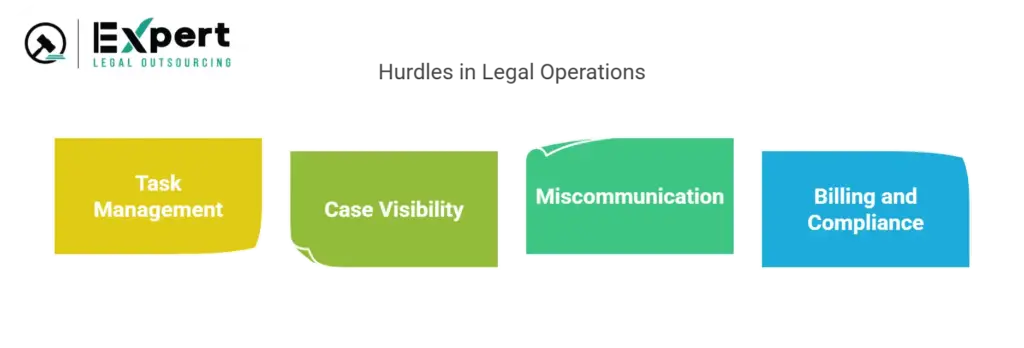Legal Operations, also known as Legal ops, is a group of people or a person who looks after the business and administrative aspects of an in-house legal department or firm. They are responsible for everything except the actual practice of law.
The legal ops team is meant to compliment the legal team. They take on business practices that prevent lawyers from managing the day-to-day minutia required to run a smooth and successful legal operation.
In this blog, we will explore the evolution of law firm operations, its purpose, its core functions and more. So, let’s get into it.
Evolution of Legal Operations
Legal operations have gone from basic administrative support to a strategic function that promotes efficiency, reduces costs, and enables technology integration into legal practice. Legal departments were once about paperwork and compliance. Once firms became larger, the need for process optimization and cost management grew too.
As the 2000s arrived with legal tech, contract management software, e-discovery, and billing streamlined workflows. The legal team was later disengaged from routine work and into strategic thought. Then 2010 introduced data-driven decision-making, allowing legal departments to track legal billing services, vendor management, and negotiate alternative fee arrangements.
Today, legal operations experts are spearheading efficiency through AI, automation, and analytics while ensuring compliance and risk management. The next evolution of legal operations will see an enhanced focus on diversity, equity, and inclusion. Making legal operations an essential part of legal departments.
Goal Behind Legal Operations
Legal Operations, with its evolution, is now streamlining and optimizing legal department functions, improving efficiency, reducing cost, and enhancing client services. Legal ops focus on strategic planning, financial management, technology and more.
We will talk about the core functions of Legal operations next.
Core Functions of Legal Operations

- Business Intelligence
Legal operations gather and analyze data to make better decisions. Using data analytics, they try to identify opportunities to optimize firm processes and workflows. Lastly, they shift the focus of the firm’s practice on understanding clients’ needs.
- Financial Management
The Legal Operations team is responsible for developing budgets and forecasts and also keeping track of a law firm’s account receivable management. This enables them to improve predictability and encourage the responsible usage of resources.
- Firm and Vendor Management
Next, they help with choosing and onboarding the right service providers. In addition, they also help with negotiating fair pricing models and performing audits on potential vendors.
- Information Governance
The legal ops team helps create policies for sharing and retaining information, manage data security, and ensure compliance. They are solely responsible for creating a guide to legal & litigation services.
- Knowledge Management
These guys are also responsible for giving lawyers and staff access to accurate, up-to-date information for legal matters and firm business. They also help capture the knowledge of team members.
- Organization Optimization and Health
They are meant to encourage team members’ work/life balance, create a hiring structure best for the firm’s cultural environment, and maintain a good talentpool. Their main purpose is to optimize the health and productivity of the firm.
- Practice Operations
The legal ops team allocates tasks to the right skills level for better speed and efficiency, managing the practice operations to another level.
- Program and Project Management
They come up with strategies that help manage projects better and enhance workflows without jeopardizing the quality of output. Legal ops are known to utilize legal project management softwares to streamline their workflows effectively.
- Service Delivery Models
They are responsible for maintaining service provider relationships by breaking apart a large project into tiny manageable tasks. This reduces reliance on more expensive law firms.
- Strategic Planning
It is vital to create team goals that align with the priorities of internal and external stakeholders which includes the market trends, client needs, and competitive forces.
- Legal Technology
With the ever-evolving digital world, working with legal software is essential to automate time-consuming, repetitive administrative tasks. This approach also increases the accuracy in data collection.
- Training and Development
Lastly, they create training materials for new employees and encourage career development for employees.
Challenges Legal Operations Experts Face?
Balancing Cost Efficiency with Quality Legal Services
Legal operation is maintaining top-tier legal services with the cost cuts. Negotiating terms, putting finely-tuned resources in place, and using alternative suppliers would help finding such balance.
Implementing and Managing Legal Technology
Yes, it’s true, legal tech not only optimizes processes but also results in trials of inevitable peculiarities such as integration hiccups, resistance from the user, and more aligned with the business needs.
Handling Data and Compliance Risks
Making these requirements involves implementing strict policies of data security, compliance with all evolving regulations as well as the risks involved in cyber security in order to ensure the safety of egal information.
Streamlining Workflows and Managing Changes
Though there is resistance in the shift from manual processes to automation. To keep up with the upgrading world, Legal operations must march forward in the transition to adopt these efficient workflows.
Aligning Legal with Business Strategy
It is essential that there is alignment between legal and business goals. Thus, legal operation experts provide strategic insights on risk, compliance, and operational efficiency.
Building A Legal Operations Team
Determine Your Needs
Different levels of legal operations have different roles and responsibilities. There is the admin-level that focuses on basic management. The optimizer-level focuses on enhancing these administrative processes. Lastly, the Strategizer focuses on maximizing results. Once you understand your needs, you can pinpoint what position you need to hire.
Choose The Role
Trying to build a complete team from scratch? Well, that’s a lot to handle. The time and investment can drain your internal resources. However, if you are just starting out, its best you hire a manager rather than an analyst,
Empower With The Right Tech
Legal Operations cannot excel without advanced technology and business leaders are catching up to this new discovery. Technology allows you to automate manual legal work, streamline using legal case management software, and more. The list is basically endless.
Now that you have introduced tech to your legal ops team, they need a dedicated legal ops software that features e-billing, reporting and analytics, legal spend management and vendor management to run efficiently.
The Hurdles in Legal Operations

Legal operations experts spend most of their time dealing with problems that impact efficiency, collaboration, and regulatory compliance. Without the right software, these hurdles can lead to wasted time, miscommunication, and monetary loss.
Task Management
Legal teams have to deal with case tracking, document management, and client reporting everyday. Without Automation, they spend valuable billable hours on mundane tasks.
Solution: There are legal workflow automation software that automate deadline tracking, case update reports, and client reminders to leave time for difficult legal work.
Case Visibility
Tracking case work across multiple systems creates confusions and deadline misses, decreasing efficiency overall.
Solution: You can use legal CRM software that allows you to visualize workflows and provide real-time case visibility to keep teams aligned and on track.
Miscommunication
System disconnection creates lost emails, delayed replies, and frustrated clients awaiting live updates.
Solution: Using legal CRM software, teams and client communication come together smoothly, decreasing errors and response times.
Billing and Compliance
Broken, dismantled billing and compliance management create financial risks and inefficiencies in billable hours monitoring and budgeting.
Solution: Legal management systems now integrate time tracking, budget monitoring and compliance management for easy financial reporting and regulatory compliance.
Best Way To Co-op With These Issues

Legal technology was established solely to simplify workflows, improving collaboration, and boosting profitability for law firms.
Through the automation of case tracking, client updates and many more routine tasks, legal ops experts can reduce manual effort and focus on more important matters at hand. Keeping track of deadlines with real-time reminders will ensure that nothing falls through the cracks.
With hybrid and remote work becoming the new norm, effective collaboration is more important than ever before. Legal process outsourcing is known to be encouraging team collaboration and providing centralized case handling systems by integrating legal project management tools. Overall, improving productivity and efficiency.
With Legal process outsourcing companies, transparency tops the list for clients and their integration of legal technology empowers to provide up-to-date status of the work progress.
Career Options As A Legal Ops
| Legal Operations Manager | Legal Operations Specialist | Legal Operations Analyst |
| Also known as Legal Operations Director | Execures department projects and goals | Expert on using Tech suite to track and understand analytics |
| Supports the Team | Creates and Improves processes | Responsible for examining the legal team’s operations to identify change and implement those. |
| When the head of legal operations is unavailable, they report directly to the General Counsel and Overseas tasks | Tackles hands-on work of legal ops and report their work to the Manager | They try to stay within the team budget so that they can understand where better to allocate resources and save costs. |
| Go-to source for project status updates, budget questions, and productivity reports. | Handle tasks such as updating each individual matter or they might handle outreach to stakeholders. | Might handle other departmental reporting on core key performance indicators (KPIs) |
Conclusion
One thing we have confirmed is that Legal Operations is essential for a business to run their legal processes smoothly. Without legal ops, practicing law would become challenging.
We have touched down on the evolution of Legal ops, its core functions, and the challenges legal operations experts face. Then, we discussed the best way of building a legal operations team, the hurdles a business legal ops team faces and the best way to deal with these issues.
Then, we explored the various career options as a part of the legal ops team. Now that you understand what a law firm operation is and how your law department works, you need to start assembling your team.

Rafia Alam Rowshni delivers a unique combination of legal knowledge and content creation talent using SEO Tools and SERP analysis. She has a solid background in public health and legal services and knows the complexities of the legal world. She can translate complex subjects into simple, concise, and entertaining information that audiences can actually use.




